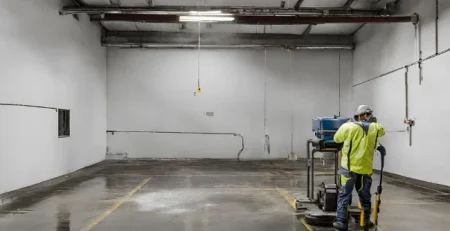Churches play a vital role in communities as places of worship, revered for their sacred and spiritual significance across all cultures. To ensure they remain safe and welcoming, regular cleaning is essential. Understanding the frequency and factors influencing church cleaning is crucial for leaders and caretakers to maintain these cherished spaces effectively.
Why is it important to clean churches regularly?
Maintaining a clean church is crucial for providing attendees with a safe and welcoming environment for worship and fellowship. Regular cleaning not only ensures safety but also upholds the sanctity and appeal of the space. Here are a few reasons why churches should be cleaned regularly:
- It increases the spiritual wellbeing:
A clean church enhances the spiritual experience for worshippers and those who pray there. Regular attendees can focus better, find tranquility, and fully engage in religious services.
- Ensures better health and safety:
Regular cleaning will help reduce germs and allergens and ensure the health and safety of those who attend the church.
- Increases longevity:
If regular cleaning is done properly, all the items cleaned such as furniture, fixtures, and carpets will last longer and will not have to be replaced as often.
- Better first impression:
When the church is clean, it leaves a positive first impression and it may attract new churchgoers as well as create and maintain a sense of community.

How often should churches be cleaned?
Understanding how often a church should be cleaned is crucial. However, this depends on several factors, including:
- Size and layout of the church
- What type of activities and events it hosts
- The number and ages of those attending
- The season and weather conditions
- The codes and regulations for public health and safety enforced locally
As a good rule of thumb, churches should be cleaned weekly, and it is always best for the cleaning to be done after the main services. Certain areas of the church should be cleaned more frequently, including:
- Areas that are high traffic such as hallways, restrooms, offices etc.
- Nurseries, kitchens, storage rooms, and any other high-risk areas
- Areas that are highly visible such as altars, pews, windows, and doors
- Carpets, rugs, instruments, equipment, and any other high-maintenance items
What is the proper cleaning schedule?
Your schedule may be a little different depending on the schedule of your church, but some general guidelines include:
- Daily cleaning:
- Trash bins should be emptied
- Sweeping and mopping of areas that are high touch
- Restroom cleaning
- Cleaning the dust off of various surfaces and pews
- Replacement of candles
- Weekly cleaning:
- Vacuuming of carpets
- Window cleaning
- Making sure all woodwork is polished
- Always check for pest infections
- Wipe down all surfaces
- Monthly cleaning:
- Make sure all carpets and any upholstery are deep cleaned
- Always check for wear and tear
- Restock any cleaning supplies as needed
- All light fixtures and ceiling fans should also be cleaned
- Seasonal cleaning:
- Clean and inspect the HVAC systems
- Make sure to power wash any exterior surfaces that need to be cleaned
- Ensure all air filters are replaced
- Do maintenance on any landscaping and outdoor spaces
Church Cleaning Guidelines and Best Practices
Churches should adhere to the standard CDC cleaning and disinfecting guidelines to prevent the spread of viruses and disease-causing organisms. Here are some important guidelines to follow:
- Always make sure that the right equipment and supplies are used when you are cleaning and disinfecting. You should always use the proper vacuums, buckets, brooms, sponges, cloths, cleaners, gloves, masks etc.
- It is crucial to follow all instructions when you are using equipment and supplies. This means that you should read all labels, wear the proper gear, test surfaces etc.
- Always clean before you disinfect. This means you should remove any dirt, grease, and stains with soap and detergent first. Then you should disinfect to kill germs and bacteria that may be on the surfaces with specific chemicals or heat.
- Your cleaning should be focused on high-touch areas including doorknobs, faucets, buttons, phones etc.
- It is important to use proper methods to clean various surfaces, as different surfaces require different techniques for disinfecting and cleaning.
- For example, you need to clean nonporous surfaces (metal, glass) using a cloth with a disinfectant so you can wipe it down.
- For porous surfaces that are soft, you should use a brush and remove the debris first and then use a cloth or a sponge to spot clean them.
- Electronics should be cleaned with a dry cloth, and you should first try to remove dust first. Then you can use an alcohol-based cleaner to clean them.
Who should have the responsibility of cleaning the church?
The cleaning of the church should be shared by various parties at the church, including:
- Staff of the church: These are the people that work for the church including the pastor, ministers, administrators, and secretaries. They can help by cleaning their own offices and workspaces and they can ensure that the church is clean.
- Volunteers in the church: Volunteers can include members, friends, and visitors. They can help with many tasks in the church and be assigned to clean specific areas based on when they are available.
- A professional cleaning crew: A cleaning company can provide professional commercial cleaning to the church. They are trained to clean large and complex areas of the church as they have the proper experience, training, methods, and equipment.
Ensuring the church remains clean is both vital and necessary. The frequency of cleaning depends on factors such as its usage, location, size, and any special events it hosts. Establishing a consistent cleaning schedule and utilizing professional services can create a welcoming environment and preserve the longevity of church items.
Maintaining a clean church is not only an act of reverence but also a practical necessity. By implementing regular cleaning routines and possibly engaging professional services, you guarantee that the church remains a pristine and inviting sanctuary for all.
Professional Church Cleaning
Do you need a church cleaned? Look no further than Stratus Building Solutions. We offer comprehensive church cleaning services, including janitorial work, for churches of all sizes. Our highly trained professionals employ effective green cleaning methods to clean your church quickly and efficiently. For all your commercial cleaning needs, Stratus Building Solutions of Palm Beach, FL, is here to help. To discover more about our church cleaning services, contact us at (561) 469-8795.











